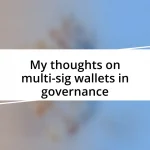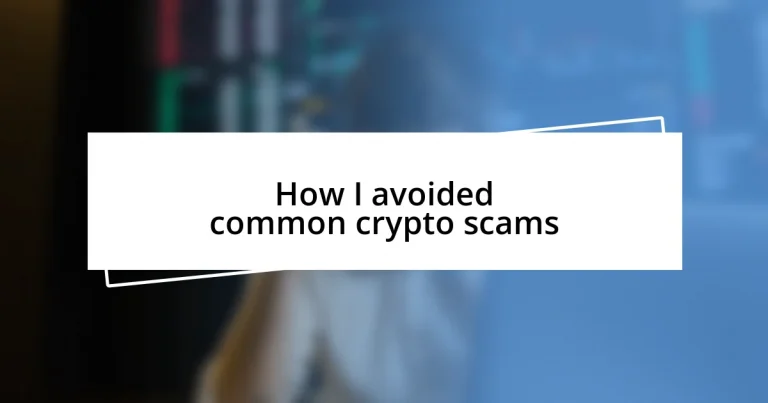Key takeaways:
- Recognizing crypto scams requires a skeptical mindset and awareness of common red flags, such as promises of unrealistic returns and lack of transparency.
- Thorough research of crypto projects, including checking the team’s background and community sentiment, is crucial for informed investment decisions.
- Utilizing security measures like secure wallets, two-factor authentication, and reliable tracking platforms can significantly reduce the risk of falling for scams.
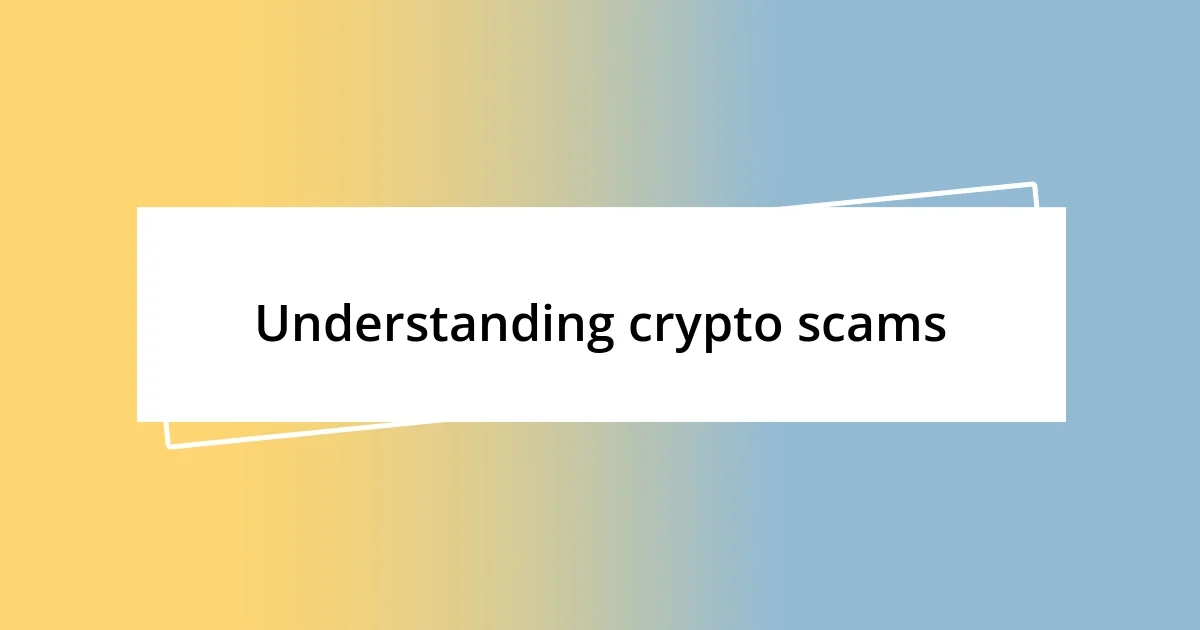
Understanding crypto scams
Crypto scams can take many forms, from phishing emails to fraudulent investment schemes. I remember when I first dipped my toes in the crypto waters; the sheer number of offers that flooded my inbox was overwhelming. It made me wonder: how can legitimate opportunities exist alongside so many deceptive traps?
One of the most eye-opening moments for me was when a friend nearly fell for a Ponzi scheme that claimed to double your Bitcoin overnight. The urgency and promises of guaranteed returns were so appealing that it was easy to see how anyone could be lured in. I couldn’t help but feel the pressure; how do you distinguish between a genuine offer and a scam when emotions like excitement cloud your judgment?
Understanding these scams goes beyond just recognizing the red flags; it requires a mindset shift. I found myself constantly asking, “If it sounds too good to be true, could it really be?” This internal dialogue was crucial in developing a more skeptical outlook. It’s important to embrace a cautious curiosity that allows you to explore opportunities without falling victim to the manipulative tactics used by scammers.
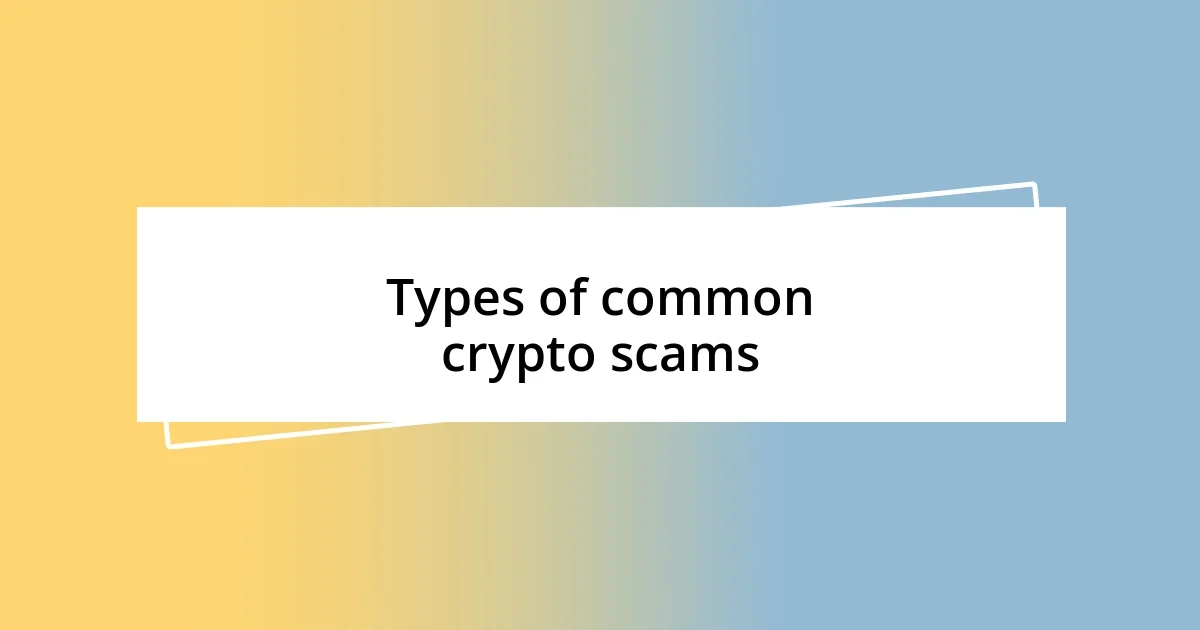
Types of common crypto scams
I’ve seen several types of crypto scams firsthand, and the variations can be quite shocking. For instance, phishing scams often disguise themselves as authentic communications from exchanges or wallet providers. I remember receiving an eerily convincing email that seemed to be from a well-known exchange, urging me to verify my account details. It was a stark reminder of how easily trust can be manipulated online.
Another prevalent scam type is the fake investment scheme. I met someone who invested in a platform boasting guaranteed high returns with little risk—a classic red flag. When I asked him if he had researched the platform, his response was that it just looked “too good to check.” That encounter reinforced my belief that thorough research is vital. Trust me, taking the time to scrutinize these offers can spare you from significant financial loss.
Lastly, I can’t overlook the social media scams that have exploded in recent years. I’ve seen many influencers promoting wallet apps or coin offerings with little transparency. I often find myself questioning their motivations. Are they genuinely interested in helping their followers, or are they just cashing in on the latest trend? It’s a reminder that not everything shown online is trustworthy, and relying solely on social proof can lead to costly mistakes.
| Type of Scam | Description |
|---|---|
| Phishing Scams | Fraudulent emails or messages pretending to be from legitimate sources, aimed at stealing personal information. |
| Fake Investment Schemes | Promising high returns with minimal risk, often with little to no research backing. |
| Social Media Scams | Influencers or users promoting dubious crypto products, lacking transparency and often profit-driven. |
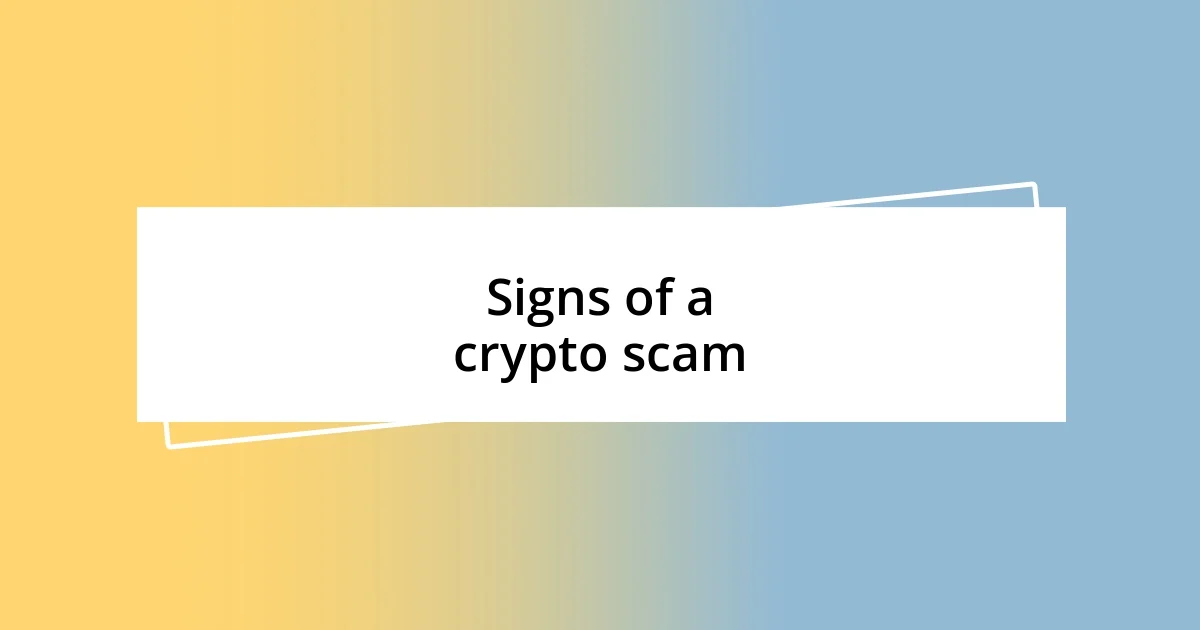
Signs of a crypto scam
When navigating the world of cryptocurrencies, it’s crucial to watch for specific telltale signs of scams. I distinctly remember a chat with an acquaintance who shared a story about an exchange that promised massive gains in a short time—how tempting it can be when you’re yearning for that kind of success! Yet, there was something off: the lack of verifiable information about the project and the anonymity of its founders raised red flags. It was a sobering moment that highlighted how easy it is to overlook basic due diligence when excitement takes over.
- Promises of unrealistic returns or quick profits.
- Pressure to act fast, often accompanied by a countdown or urgency tactics.
- A lack of transparency regarding company information or team members.
- Requests for personal information, such as passwords or private keys.
- Inconsistent or poorly written communications that feel unprofessional.
Another vivid memory comes from a recent online workshop that I attended, where a presenter was overly eager to showcase an “exclusive” investment opportunity. As the hype built around this project, I couldn’t shake the feeling of unease. My instincts kicked in, leading me to dig deeper. The absence of a clear whitepaper or roadmap was concerning. Trust me, it’s essential to remain vigilant and ask critical questions before diving in, no matter how alluring the prospect might seem.
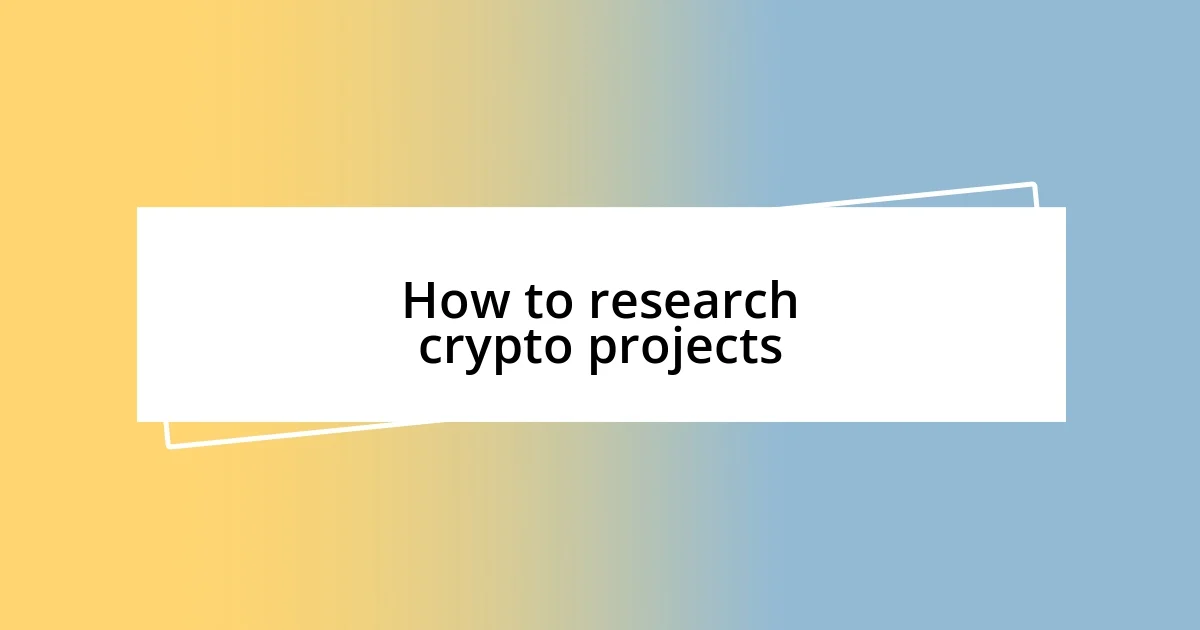
How to research crypto projects
Researching crypto projects is absolutely essential for anyone entering the space. I remember a time when I stumbled upon a project that had all the flashy website elements but little substance behind it. It struck me how many people were entranced by the aesthetic appeal rather than the foundational knowledge. I spent time digging into the project’s whitepaper, checking for clear goals, technology explanations, and utility—this information is often where the truth lies.
One major aspect I always pay attention to is the team behind the project. If you can’t find solid information about the founders and developers, that’s usually a huge red flag. I recall coming across a project that initially seemed promising, but when I researched the team, I found a ghost list of names with no professional histories. It made me question the legitimacy of the whole endeavor. It’s astonishing how often people overlook this part when they’re excited about potential gains.
Another vital tactic is following community discussions. I learned this the hard way when I invested in a project with glowing reviews but later discovered criticism buried in forums. Engaging with other investors or checking platforms like Telegram and Reddit can provide invaluable insights. Have you ever wished you had listened to the warnings of others? For me, those moments have reinforced the idea that a healthy skepticism coupled with diligent research can make all the difference in navigating this complex landscape.
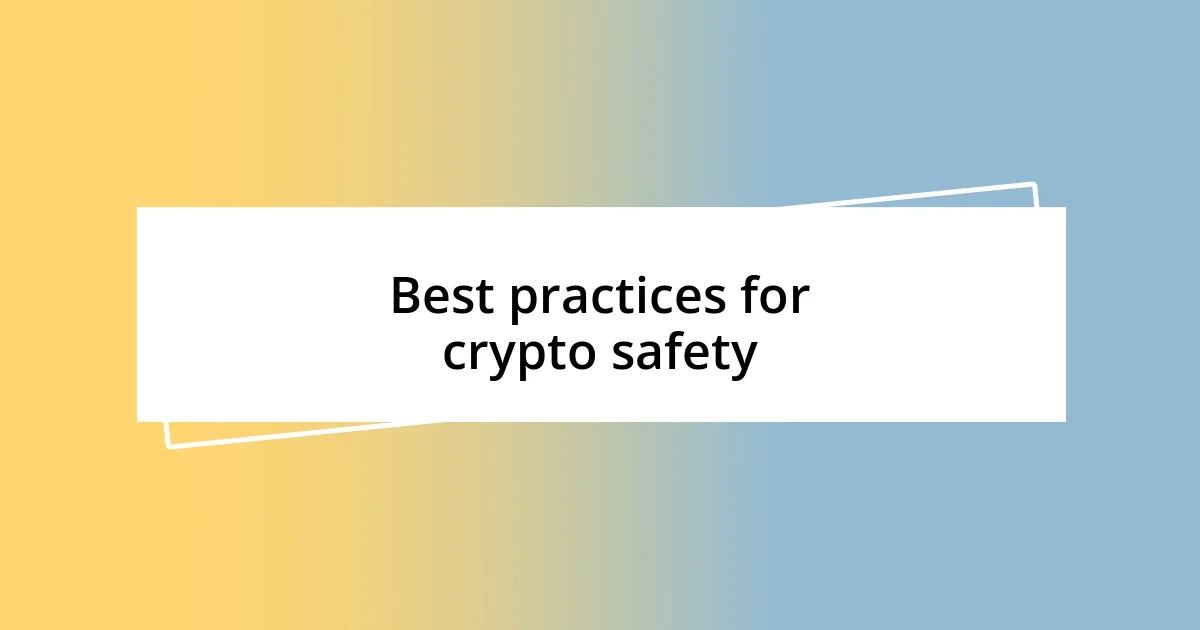
Best practices for crypto safety
When it comes to staying safe in the crypto space, I can’t stress enough the importance of using secure wallets. I learned this lesson when I accidentally linked my account to an online exchange that turned out to be less than trustworthy. It was a wake-up call! Now, I always prioritize hardware wallets for storing my assets. They add an extra layer of security, keeping my investments away from potential hacks. Trust me, taking that extra step can prevent sleepless nights worrying about your financial safety.
Always enable two-factor authentication (2FA) whenever possible. I adopted this practice after a friend’s account was hacked because he didn’t have it set up. It’s easy to overlook, but having that second line of defense is a simple way to significantly enhance your protection. Have you ever considered how often you see notifications urging you to secure your accounts? Following through on those suggestions can save you from a world of headaches down the line.
Another crucial practice is to be cautious with links and attachments in messages, especially those claiming to be from your favorite exchanges or wallets. I remember receiving an email that looked legitimate, but something felt off. Instead of clicking, I decided to verify independently and discovered it was a phishing attempt. Your instincts are powerful—never underestimate them! This kind of diligence might seem tedious, but it pays off; after all, a moment of caution can safeguard your hard-earned crypto assets.
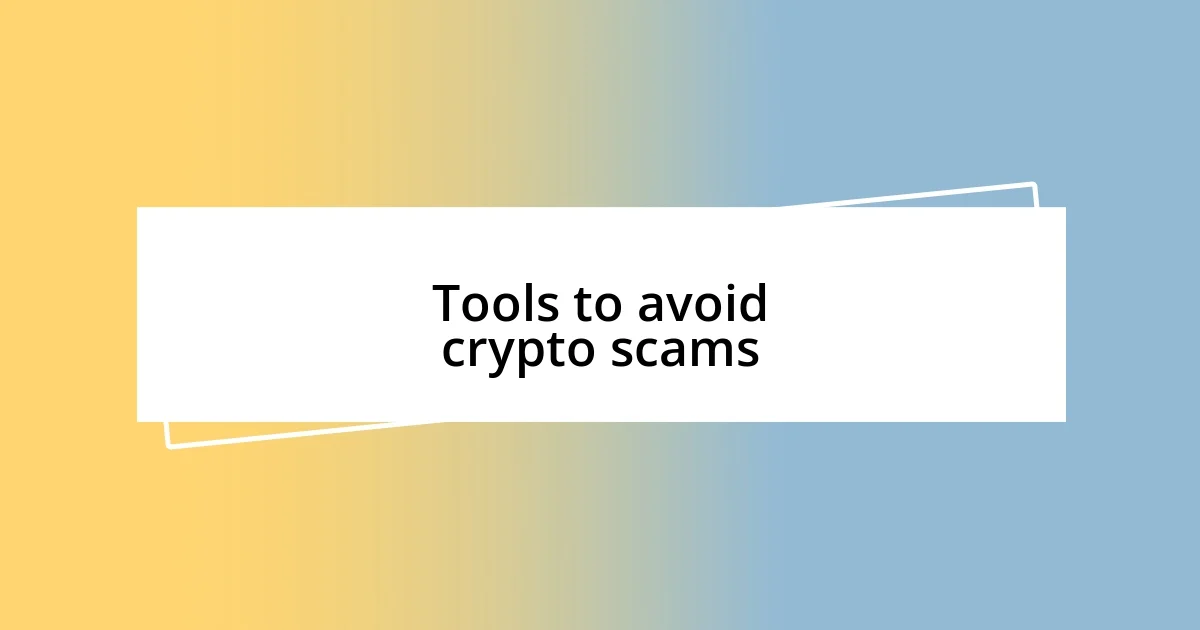
Tools to avoid crypto scams
One of the most valuable tools I’ve found for steering clear of crypto scams is a reliable tracking platform. This became clear to me when I first tried using a service that offered real-time analysis of market trends and token performance. I was surprised to discover some projects flagged as “high risk” based on transparency and trading volumes. Imagine saving yourself from making the same mistake I once did—investing blindly in a token that was struggling from day one!
Another tool I hold in high regard is the plagiarism checker for whitepapers and project details. It may sound odd, but back during my early investments, I encountered a project whose whitepaper was a regurgitation of another successful project’s document. By running it through a checker, I realized I was about to fund an imitation rather than a genuine innovation. Have you ever found yourself questioning the originality of something? Trust me, taking the time to utilize this simple tool can help you make more informed decisions.
Lastly, I recommend leveraging social media analysis tools to gauge community sentiment. It’s eye-opening how much conversation can reveal about a project’s reputation. Early on, I came across an up-and-coming coin that had rave reviews, but a deeper dive into Twitter sentiment unveiled a chorus of dissatisfied voices. Wouldn’t it have been beneficial if I’d considered those perspectives before diving in? The insights you get from these platforms can serve as a crucial buffer against falling prey to hype.
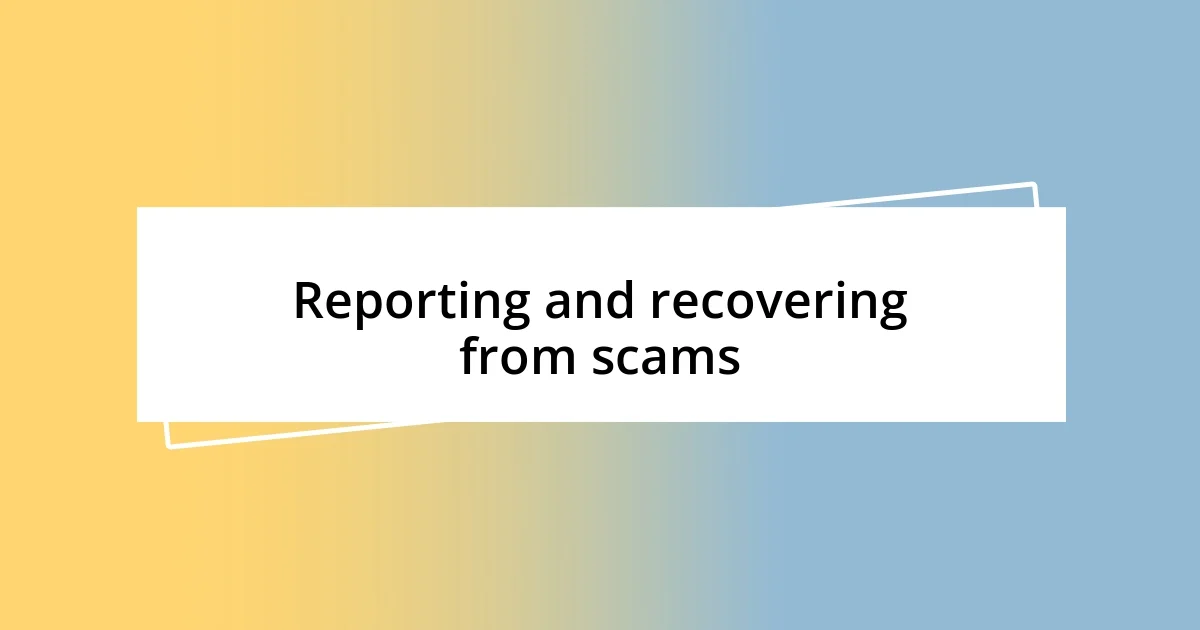
Reporting and recovering from scams
Reporting a scam can be daunting, but it’s essential to take action. I remember the frustration I felt after discovering I had fallen victim to a scam. My first step was to collect all possible evidence, like transaction IDs and screenshots. This not only helped me piece together exactly what happened but also provided crucial information when I reported it to my local authorities and relevant exchanges. Have you ever thought about what you would need to support your case? Keeping detailed records can make the process a little smoother.
When it comes to recovery, it’s important to manage your expectations. In my experience, the likelihood of recovering funds can vary dramatically depending on the scam’s nature. I once read about someone who managed to reclaim assets through diligent follow-ups and persistence, which honestly inspired me. But I learned quickly that each situation is unique. It’s valuable to stay informed about your options, including the potential for insurance coverage if you used certain platforms. Have you explored various avenues that might enhance your chances of recovery?
Lastly, don’t underestimate the power of community support during this challenging time. After my incident, I joined a forum where others shared similar experiences. It felt good to connect with others who understood the emotional rollercoaster I was on. Being in that space allowed me to gain insights on both prevention and recovery. Have you reached out for support? Sometimes, talking things through can provide not only solace but practical advice on the best ways to proceed.





